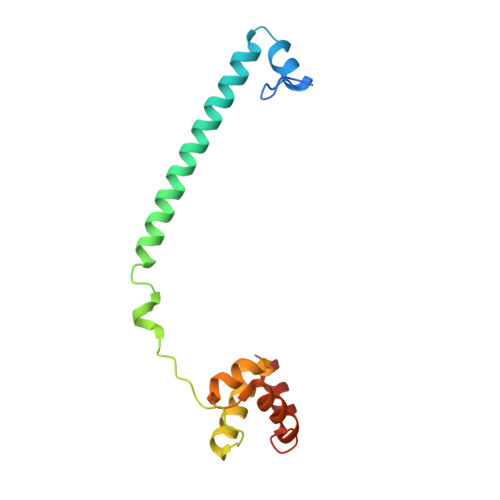Development and Structural Evaluation of N-Alkylated trans-2-Phenylcyclopropylamine-Based LSD1 Inhibitors.
Niwa, H., Sato, S., Handa, N., Sengoku, T., Umehara, T., Yokoyama, S.(2020) ChemMedChem 15: 787-793
- PubMed: 32166890
- DOI: https://doi.org/10.1002/cmdc.202000014
- Primary Citation of Related Structures:
6KGK, 6KGL, 6KGM, 6KGN, 6KGO, 6KGP, 6KGQ, 6KGR - PubMed Abstract:
Lysine-specific demethylase 1 (LSD1) is a flavin adenine dinucleotide (FAD)-dependent enzyme that catalyzes the demethylation of histone H3 and regulates gene expression. Because it is implicated in the regulation of diseases such as acute myeloid leukemia, potent LSD1-specific inhibitors have been pursued. Trans-2-phenylcyclopropylamine (2-PCPA)-based inhibitors featuring substitutions on the amino group have emerged, with sub-micromolar affinities toward LSD1 and high selectivities over monoamine oxidases (MAOs). We synthesized two N-alkylated 2-PCPA-based LSD1 inhibitors, S2116 and S2157, based on the previously developed S2101. S2116 and S2157 exhibited enhanced potency for LSD1 by 2.0- to 2.6-fold, as compared with S2101. In addition, they exhibited improved selectivity over MAOs. Structural analyses of LSD1 co-crystallized with S2101, S2116, S2157, or another N-alkylated inhibitor (FCPA-MPE) confirmed that the N-substituents enhance the potency of a 2-PCPA-based inhibitor of LSD1, without constituting the adduct formed with FAD.
Organizational Affiliation:
RIKEN Systems and Structural Biology Center, Yokohama, 230-0045, Japan.


















